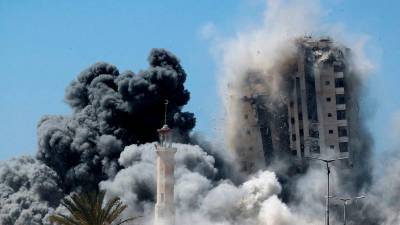PARIS: Growing numbers of Western artists across music, film, and publishing industries are advocating for a cultural boycott of Israel due to the Gaza war.
These figures hope to replicate the success of the apartheid-era blockade against South Africa through increased public pressure.
British actor Khalid Abdalla expressed confidence that global opinion is reaching a critical turning point regarding Israel’s actions.
An open letter from Film Workers for Palestine has gathered thousands of signatories including Emma Stone and Joaquin Phoenix.
These celebrities have pledged to sever ties with Israeli institutions they believe are implicated in genocide against Palestinians.
Recent Emmy Awards winners and Venice Film Festival participants have consistently addressed the Gaza situation during their acceptance speeches.
British trip-hop group Massive Attack recently joined the “No Music for Genocide” collective to block streaming of their songs in Israel.
The boycott movement extends to potential exclusion from Eurovision, author open letters, and Spanish-led efforts to bar Israel from sports events.
Israeli conductor Ilan Volkov announced he will no longer perform in his home country during a recent British concert.
Swedish academic Hakan Thorn sees clear parallels between current efforts and the historical boycott movement against apartheid South Africa.
Thorn identified a significant shift in global opinion during spring 2024 when famine images emerged from Gaza.
The modern boycott movement faces complications due to historical sensitivities around antisemitism and Holocaust remembrance.
Israel’s government consistently labels boycott supporters as antisemitic and Hamas sympathisers according to Prime Minister Benjamin Netanyahu.
University of London’s David Feldman notes confusion around defining antisemitism’s boundaries in this context.
Feldman emphasises that the boycott movement primarily protests Israel’s destruction of Gaza and ongoing civilian casualties.
Historical analysis suggests cultural boycotts alone may not achieve political change without broader economic pressure.
The South African boycott movement required thirty years and economic isolation before achieving its objectives.
Many Israeli artists reportedly oppose the war but feel cultural boycotts weaken their internal opposition efforts.
Screenwriter Hagai Levi estimates ninety percent of Israel’s artistic community stands against the current conflict. – AFP
